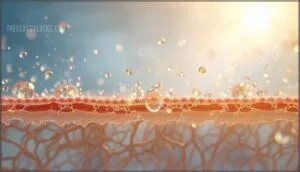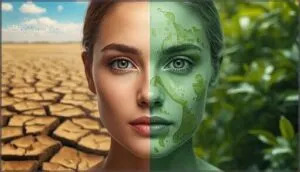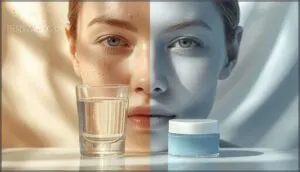This site is supported by our readers. We may earn a commission, at no cost to you, if you purchase through links.

Clinical studies show that topical hyaluronic acid increases skin hydration by 134%, while drinking water alone produces no measurable plumping effect on dehydrated skin.
The truth is more nuanced: hydration aids your skin indirectly through improved circulation and cellular function, but it can’t replace what your moisture barrier does. Understanding how water actually affects your skin—and what really works to keep it hydrated—means separating marketing myths from dermatological science.
Table Of Contents
- Key Takeaways
- Does Drinking Water Hydrate Skin?
- How Skin Hydration Works
- Effects of Water Intake on Skin Appearance
- Scientific Evidence on Water and Skin Health
- Common Myths About Water and Skin Hydration
- Difference Between Dry and Dehydrated Skin
- Effective Ways to Hydrate Skin
- Lifestyle Factors Affecting Skin Hydration
- How Much Water Should You Drink for Skin?
- Frequently Asked Questions (FAQs)
- Conclusion
Key Takeaways
- Drinking water supports skin health indirectly through improved circulation and cellular function, but it doesn’t deliver hydration directly to your face—your body prioritizes internal organs first, and the moisture barrier does most of the work keeping your skin hydrated.
- Topical treatments like hyaluronic acid serums and ceramide creams outperform water intake alone, with clinical studies showing topical hyaluronic acid increases skin hydration by 134% while drinking water produces no measurable plumping effect on dehydrated skin.
- The “eight glasses a day for glowing skin” myth lacks scientific backing—research shows weak evidence linking water intake to wrinkle reduction or facial plumping, and your skin’s stratum corneum barrier limits water absorption from within.
- Effective skin hydration requires a combination approach: drinking adequate water (around 2 liters daily if you’re starting from low baseline hydration) plus topical moisturizers that use humectants, emollients, and occlusives to directly lock moisture into your skin’s outer layers.
Does Drinking Water Hydrate Skin?
Why does drinking water feel like the supreme skin-care advice everyone swears by? The short answer is that water intake does support skin hydration, but not in the direct way most people imagine. When you drink water, it doesn’t race straight to your skin cells like a targeted delivery system. Instead, it’s absorbed into your bloodstream, filtered through your kidneys, and distributed throughout your body based on physiological priorities.
Your skin benefits indirectly through improved blood flow and cellular function. Research shows that increasing daily water intake to about 2 liters can meaningfully improve skin hydration levels, particularly if you’re starting from a low baseline or dealing with dry skin. Studies demonstrate progressive improvements over 15 to 30 days, with enhanced hydration in both superficial and deeper skin layers.
That said, drinking water alone won’t erase wrinkles or shrink pores—your skin’s moisture barrier responds more effectively to topical treatments than systemic hydration. Understanding the role of skin health benefits is essential for developing an effective skincare routine.
How Skin Hydration Works
To understand whether drinking water actually hydrates your skin, you need to know how your skin maintains moisture in the first place.
Your skin isn’t just waiting passively for water to arrive from your bloodstream—it has its own intricate system for holding onto hydration. Let’s look at the key players in this process.
Skin Structure and Moisture Barrier
Your skin isn’t just a wrapper—it’s a three-layered fortress designed to keep moisture in and threats out. The epidermis, dermis, and subcutaneous tissue work together to maintain skin health, but the real MVP is your moisture barrier.
This thin shield relies on lipid balance and precise skin pH to regulate hydration mechanisms and minimize water loss. When ceramides, cholesterol, and fatty acids align properly, your barrier function stays strong, locking in moisture levels and protecting against dehydration.
Maintaining healthy skin relies on understanding skin pH balance to prevent damage.
Role of The Stratum Corneum
At the heart of your moisture barrier sits the stratum corneum—a 10–15 micrometer layer that holds about 10–30% water content in healthy skin. This outermost shield relies on a precise lipid matrix of ceramides and fatty acids to prevent water loss and maintain hydration metrics.
Corneocyte function determines how well your skin barrier locks in skin moisture, and measurements like corneometry quantify this water barrier strength. When your lipid matrix stays intact, you moisturize effectively and protect skin health from the outside in.
Effects of Water Intake on Skin Appearance
Here’s the truth: drinking water does affect your skin, but not the way most people think. Your skin won’t transform overnight from guzzling extra glasses, yet chronic dehydration can show up on your face in ways you mightn’t expect.
Let’s look at what actually happens to your skin’s elasticity, firmness, tone, and texture when you’re properly hydrated versus when you’re running on empty.
Impact on Skin Elasticity and Firmness
Water’s influence on your skin extends beyond surface-level hydration. When intake increases to around two liters daily, skin elasticity can improve by up to 14%, particularly if you’re starting with lower hydration levels. This happens because adequate hydration bolsters collagen integrity and helps maintain the dermal extracellular matrix.
Studies show that combining proper water consumption with collagen support yields firmness boosters that improve skin moisture retention by roughly 11%. The stratum corneum becomes more pliable under ideal hydration, translating to measurable elasticity improvement and better skin health.
Influence on Skin Tone and Texture
Proper hydration levels translate into visible improvements in skin radiance and texture smoothing. Research shows that consuming around nine cups of water daily for a month can increase skin opacity and brightness by 23%, while well-hydrated individuals show 25% higher light reflectance—a key marker of luminosity.
Your skin tone becomes more even as enhanced circulation delivers nutrients efficiently, and texture smoothing occurs through reduced transepidermal water loss. Adequate moisture balance fosters keratinocyte cohesion, cutting surface irregularities by up to 20% and promoting that healthy glow you’re after.
Scientific Evidence on Water and Skin Health
You’ve likely heard conflicting claims about whether drinking water actually improves your skin—some swear by it, while others dismiss it as wishful thinking. The truth is, the scientific evidence on this topic is limited and sometimes misinterpreted.
Let’s look at what research actually shows and what dermatologists make of these findings.
Research Findings and Limitations
When you sift through the research on drinking water and skin hydration, you’ll find the evidence quality surprisingly thin. Only six studies met rigorous criteria in a recent systematic review—most had small sample sizes and short study periods of just 2–6 weeks.
The data analysis revealed slight improvements in stratum corneum hydration, particularly for people drinking less than 2 liters daily, but research gaps remain glaring: no long-term trials exist, and scientific debates continue about the biological mechanisms connecting water intake to skin moisture.
Dermatologists’ Perspectives
Board-certified dermatologists agree: you can’t drink your way to plump, dewy skin. While water intake aids overall cellular function, internal organs claim most of it before reaching your skin.
Dermatology experts emphasize combining hydration methods—drinking 8–10 glasses daily plus topical moisturizers with ceramides and hyaluronic acid.
Skin care routines that pair strategic water intake with barrier-protecting products deliver real results, not the wrinkle-erasing myths circulating on social media.
These dermatologist insights on skin health reveal that hydration and skin health depend on holistic approaches, not water alone.
Common Myths About Water and Skin Hydration
You’ve probably heard that drinking eight glasses of water a day will give you glowing, wrinkle-free skin. It’s one of those beauty tips that sounds almost too simple to be true—and the science suggests it mostly is.
Let’s clear up what water can and can’t actually do for your skin.
Debunking The “Plumping” Effect
You’ve probably heard it a thousand times: drink more water for plump, dewy skin. But here’s what dermatologic research actually shows—drinking water doesn’t plump your skin. Clinical reviews by Harvard and BBC found no proof that eight glasses daily improves skin hydration or facial fullness.
Despite popular belief, drinking water won’t plump your skin—Harvard and BBC reviews found no evidence linking eight daily glasses to improved facial hydration
Your stratum corneum forms a barrier that limits water absorption from within, prioritizing essential organs over surface tissues.
Topical hyaluronic acid increased skin hydration by 134% in trials, while drinking water alone showed no measurable plumping effect on dehydrated skin unless severe dehydration was present.
Misconceptions on Wrinkle Reduction
Water won’t erase wrinkles—that’s one of skincare’s most persistent hydration myths. Wrinkle formation stems from collagen loss (roughly 1% annually after 30), UV damage, and elastin breakdown, not dehydration.
A 2018 review found “weak” evidence linking water intake to wrinkle reduction, while a 2015 study showed no improvement in fine lines despite increased hydration.
Dermatologists confirm that drinking water aids skin aging resistance indirectly but can’t reverse structural changes or prevent wrinkles caused by sun exposure and natural collagen degradation.
Difference Between Dry and Dehydrated Skin
People often use “dry” and “dehydrated” interchangeably, but your skin sees them as two different problems requiring separate solutions. Understanding which one you’re dealing with makes all the difference in how you treat it.
Let’s break down what causes each condition and how to spot the signs.
Causes of Dry Skin
Your skin becomes dry for multiple, interconnected reasons. Environmental factors like low humidity and cold weather strip moisture from your epidermis—indoor heating can drop humidity below 20%, while harsh products like alkaline soaps reduce hydration by up to 45%.
Genetic predisposition matters too: conditions like ichthyosis vulgaris and hormonal changes during menopause increase dry skin risk markedly.
Nutrient deficiencies, certain medications, and medical conditions like diabetes also compromise your skin’s ability to maintain adequate hydration.
Signs of Dehydrated Skin
Unlike dry skin, dehydrated skin signals fluid deficiency rather than oil depletion. You’ll notice reduced skin elasticity when pinched—a delay of more than two seconds indicates at least 5% body weight fluid loss.
Fine lines become more prominent, especially around your eyes and mouth, while your complexion appears dull and uneven.
Persistent itch, rough texture, and visible flaking accompany moderate to severe dehydration, affecting both comfort and appearance.
Effective Ways to Hydrate Skin
While drinking water aids your body’s overall function, it won’t magically transform your skin from the inside out. The most reliable way to hydrate your skin is by working with its outermost layers directly.
Here’s what actually works when you want to lock in moisture and strengthen your skin’s barrier.
Topical Moisturizers and Ingredients
Your best defense against water loss isn’t another glass—it’s what you put on your skin. Topical moisturizers deliver hydration directly where you need it, using three key players: humectants like glycerin and hyaluronic acid that pull moisture in, emollients such as natural oils that smooth and soften, and occlusive agents like petrolatum that seal everything beneath.
Ceramide therapy strengthens your skin’s barrier, while hydrating serums pack concentrated hydrating ingredients that work fast. Choose formulas combining all three types for maximum effect.
Using Toners, Serums, and Masks
Beyond moisturizer, hydrating formulas like toners, serums, and gel masks add serious firepower to your routine. Modern toners with humectants boost skin barrier hydration up to 45%, while serums layered underneath moisturizer deliver concentrated hydrating ingredients—hyaluronic acid alone increases moisture by 134% initially.
Sheet masks heighten the effect: studies show mask efficacy peaks at 60% hydration improvement with consistent use. The toners’ benefits and serum ingredients work together, creating a moisture cascade your skin actually absorbs.
Lifestyle Factors Affecting Skin Hydration
Your skin doesn’t exist in a vacuum—what you eat, where you live, and how you move through your day all leave their mark. While topical products matter, they’re only part of the equation regarding maintaining hydrated, healthy skin.
Let’s look at the lifestyle factors that can make or break your skin’s moisture levels.
Diet and Nutrition for Skin Health
What you eat shapes your skin from the inside out, far beyond what any moisturizer can accomplish alone. A well-balanced diet rich in specific nutrients directly aids healthy skin cell function, and the importance of hydration for skin health and wellbeing cannot be overstated.
- Omega Fatty Acids: Omega-3s strengthen your moisture barrier, reducing dryness and inflammation
- Antioxidant Role: Vitamins C and E neutralize damage and support collagen production for firmer skin
- Protein Intake: Adequate protein provides amino acids essential for collagen synthesis and skin repair
- Micronutrient Needs: Zinc, vitamin A, and niacin prevent barrier dysfunction and support wound healing
- Nutrient Balance: Mediterranean-style eating patterns with whole foods improve multiple skin conditions
Clinical evidence shows that omega fatty acids and antioxidants work synergistically to maintain barrier function, while deficiencies in key micronutrients compromise your skin’s structural integrity and resilience.
Environmental and Behavioral Influences
Your environment shapes your skin’s hydration more than you might expect. Climate impact matters—low humidity and air conditioning can drop indoor moisture below 30%, accelerating water loss from your skin’s surface.
Air pollution from urban lifestyle exposure damages your protective barrier, while water quality issues like hard or chlorinated water strip away natural oils.
Behavioral factors play a role too: chronic stress, poor sleep, and frequent alcohol-based sanitizer use all compromise your skin’s ability to retain moisture, regardless of water intake.
How Much Water Should You Drink for Skin?
You’ve probably heard the ‘eight glasses a day’ rule, but the truth is more nuanced regarding your skin. Your hydration needs depend on factors like your activity level, climate, and overall health—not a one-size-fits-all number.
Let’s look at what the science actually recommends and how you can tell if you’re drinking enough.
Recommended Daily Water Intake
Your daily fluid requirements depend on several factors, not just skin health. The U.S. National Academies recommend 15.5 cups (124 ounces) for men and 11.5 cups (92 ounces) for women from all beverages and food sources. While drinking water aids overall body hydration, remember that about 20% usually comes from food.
Physical activity, climate, and health conditions alter these baseline hydration levels. Meeting daily recommendations helps maintain proper blood flow to skin, though water intake alone won’t transform your complexion.
Monitoring Hydration for Skin Benefits
Tracking your hydration levels gives you real insight into how water intake affects skin hydration. While drinking water benefits overall health, measuring skin moisture directly reveals what truly helps hydrate skin. Consider these monitoring methods:
- Check urine color – pale yellow indicates adequate hydration for your body’s needs
- Use handheld hydration meters – these devices measure actual skin moisture levels before and after changes in water intake for skin
- Track moisturizer efficacy – note how your skin reacts to topical hydration versus increased drinking water
Objective measurements show that the effects of water on skin are complex, not automatic.
Frequently Asked Questions (FAQs)
Can drinking water reduce acne or breakouts?
Water intake promotes skin health, but it won’t directly cure acne or prevent breakouts.
Hydration therapy helps maintain your skin’s barrier function and reduces inflammation markers, yet acne depends more on sebum production, pore congestion, and bacterial activity—factors that drinking water alone can’t control effectively.
Does water temperature affect skin hydration levels?
Yes, temperature matters for skin hydration methods. Hot water strips away natural oils and disrupts your moisture barrier, increasing water loss.
Cold therapy can help seal in hydration and support barrier function.
Can overhydration negatively impact your skin?
While rare, excessive water intake can trigger hyponatremia—a dangerous drop in sodium that causes fluid imbalance and edema.
You might notice skin swelling, tightness, or even increased oiliness as your body struggles to regulate hydration balance, paradoxically worsening dehydrated skin concerns.
Does skin absorb water during bathing?
Your skin absorbs water during bathing, with studies showing about 63% of water absorption occurs through skin permeability. The stratum corneum acts as your barrier function, allowing hydration methods to work topically while maintaining epidermis hydration and water retention.
Are certain water types better for skin?
The type of water you use matters more than you’d think. Hard water—loaded with calcium and magnesium—can compromise your skin’s moisture barrier, raising pH and triggering dryness or eczema.
Soft water, by contrast, promotes hydration and lets skincare products work better.
Conclusion
You’ll chase glowing skin promises in every wellness trend, yet the answer sits in your bathroom cabinet, not your water bottle. Does drinking water hydrate skin? It bolsters your body’s foundation, but your moisture barrier does the heavy lifting.
Hyaluronic acid serums, ceramide creams, and barrier-repair treatments deliver what drinking water can’t: direct, measurable hydration where your skin needs it most. Think of water as your supporting actor—essential for the show, but never the star of plumping, glowing skin.












